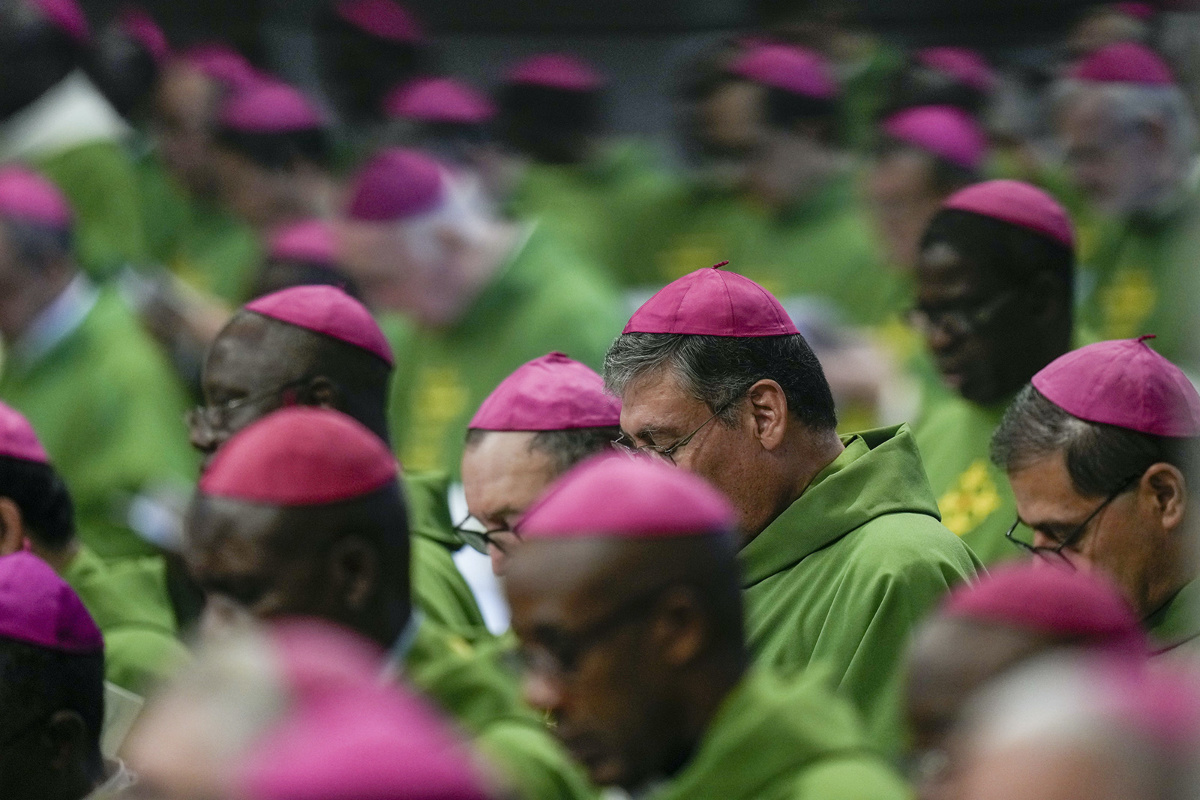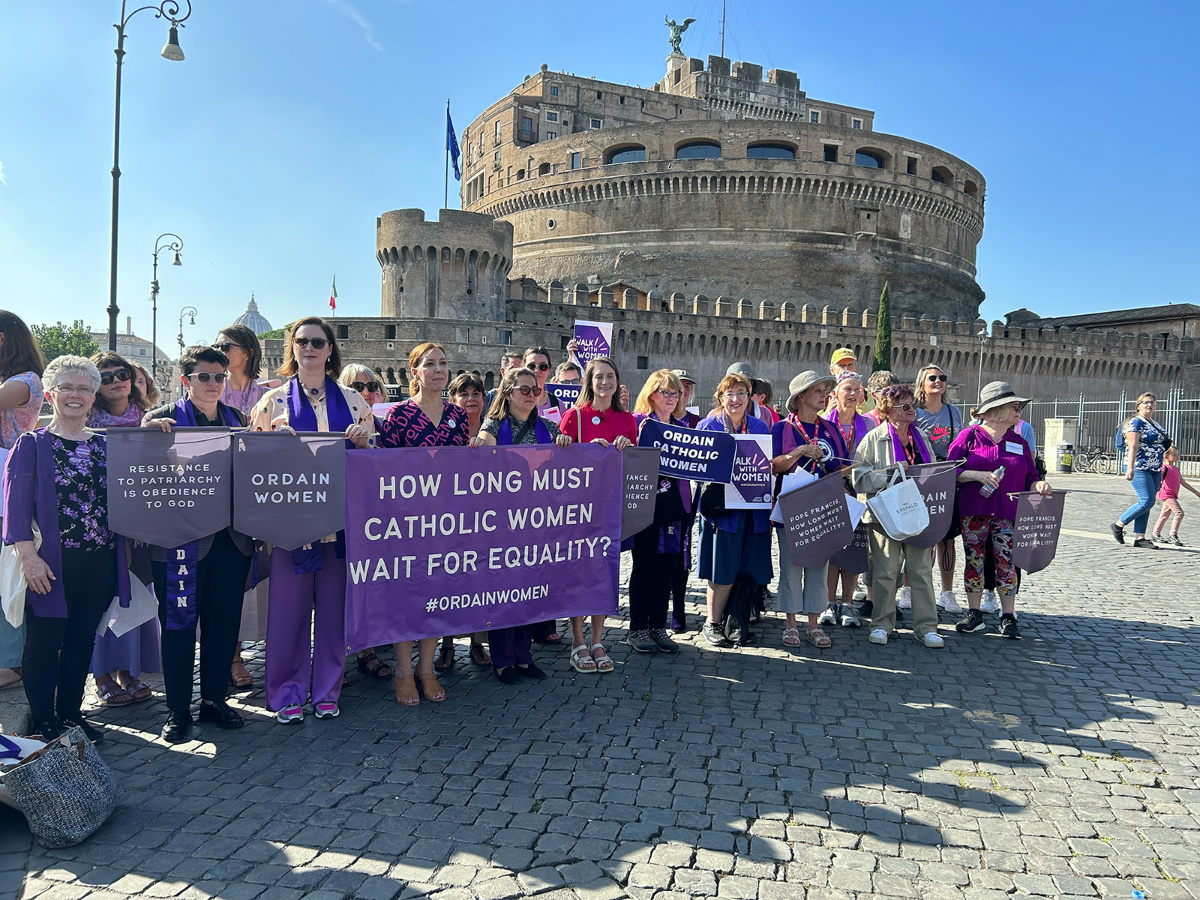Vatican City
RNS
A three-year process aimed at putting the most pressing concerns of lay Catholics front and centre in the church was reshuffled on Thursday, as the Vatican announced that it plans to push discussion of “doctrinal, ethical and pastoral issues that are controversial” to June, 2025.
The controversial issues include allowing women to be ordained as deacons, as well as welcoming LGBTQ Catholics. These and other issues of importance to Catholics, discerned in discussions at every level of the church that took place since 2021, were the subject of a meeting of bishops and laypeople at the Vatican in October and a report listing the main concerns of the faithful.

Bishops attend a Mass celebrated by Pope Francis for the closing of the 16th General Assembly of the Synod of Bishops, in St Peter’s Basilica at the Vatican, on 29th October, 2023. PICTURE: AP Photo/Alessandra Tarantino.
But a second summit, scheduled for October 2024, will now focus not on the issues the Synod on Synodality raised, but on the process itself.
“The synod of bishops will be centered on the theme of synodality,” said Cardinal Jean-Claude Hollerich, the relator general of the general assembly of the synod of bishops, at a news conference Thursday at the Vatican.
“Addressing all these other topics within the context of the Synod on Synodality is impossible,” he added.
Synodality is a loosely defined term used by Pope Francis to describe “a new way of being church,” which focuses on dialogue, welcoming and listening. But while promising to reform the traditionally hierarchical structure of the church, Francis has made clear that synodality is not synonymous with democracy. Instead, synod organizers have at various times described the synod as a soup of many ingredients, a multicolored tapestry, a large tent and a mosaic.
“Only those who experience synodality understand what it means and what its fruits are,” said Cardinal Mario Grech, the general secretary of the synod, at the same news conference.
In a letter signed 22nd February, Francis had already ordered the creation of 10 study groups, each of which will address a topic that emerged from the October 2023 synod session. Because the complexity of these topics would distract from the main theme of the synod, the Pope wrote, the synod organisers must collaborate with curial offices to study them further.
These topics include ecumenical dialogue, the formation of priests, the role of bishops and papal representatives, and theological questions on ministries and “controversial doctrinal, pastoral and ethical questions.”
The study group focusing on ministries is where “the question of women’s possible access to the diaconate can be properly posed,” the Pope’s letter read, while “the circular relationship between doctrine and pastoral care” will be handled by another study group.
The tension between doctrine and pastoral care is at the heart of discussions about LGBTQ Catholics, and many synod participants advocated for greater welcoming and inclusion.
On Thursday the synod office announced the formation of an additional five working groups to address topics such as the role of bishops, decentralisation in the church and how to inject synodality in church structures, theology and mission. These are all in keeping with the theme of the next assembly, “How to be a synodal church on mission?” Their work will be highlighted at the synod’s next meeting, in October, 2024.

Dozens of women march to the Vatican, on 6th October, 2023, calling for female ordination. PICTURE: RNS photo/Tom Reese.
Officially inaugurated in October, 2021, the road to the synod began with a massive consultation of faithful at the parish and diocesan level, in bishops’ conferences and among groups of bishops called continental assemblies. Religious organisations, Catholic charities and the faithful in the pews collaborated to discuss, elucidate and address what they identifed as the most important challenges facing the church today.
In October, 2023, the synthesis of these discussions was brought before an unprecedentedly diverse synodal assembly, which saw the participation of laymen and women sitting alongside bishops and cardinals.
The report that emerged from these lay discussions challenged the church to work with theologians, canon lawyers and experts to tackle important issues, from bishops’ accountability to the formation of priests, to the role of women in the church and the inclusion of LGBTQ Catholics.
We rely on our readers to fund Sight's work - become a financial supporter today!
For more information, head to our Subscriber's page.
Now, in preparation for the synod session that will be held from 2nd to 27th October, national bishops’ conferences, as well as Eastern churches and dioceses that do not belong to any bishops’ conference, will be asked to present new reflections on the main theme of the synod to the General Secretariat of the Synod by May. In addition, an international meeting of “Parish Priests for the Synod” will take place from 28th April to 2nd May in Rome.
Whatever the fate of the hot-button issues raised by Catholics in the synodal process, synodality is here to stay, the Vatican documents promised.
“The General Secretariat of the Synod will activate a ‘permanent forum’ to deepen the theological, canonical, pastoral, spiritual and communicative aspects of the Church’s synodality,” the documents said.
The 10 study groups will hand over an outline of the topic on 5th September, before the synodal assembly, and they are required to finish their work by June 2025. But synod organisers dismissed criticism that the Vatican is kicking the can down the road on big issues.
“The fact that the Pope has already selected groups and Vatican departments with contributions from several parts of the world to deepen the topics from the synthesis report shows that he has listened and that he is taking note,” Grech told journalists.
Hollerich said that the church is moving “slowly but surely” on a synodal path, facing “this great construction site that has been set before us.”






